How often have you started planning a trip and found your budget is unreachable? Has this left you feeling overwhelmed or disillusioned? In this post, I want to empower you with the knowledge of seven categories you should consider important. Prioritising these categories will help you find a more realistic figure to work towards for your next fantastic trip and hopefully do it debt-free.
I’ll share some budget-saving tips, strategies to stretch your holiday dollars, and unconventional saving ideas to help you meet your budget goals.
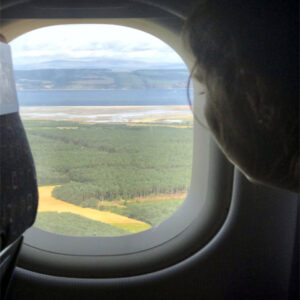
Dreaming of adventures to come flying to Scotland
What we will cover
1. Flights
3. Food
4. Activities
6. Insurance and other Administrative costs
Spoiler: From the outset, this is not a magic bullet but a mindset builder to help you and your spouse discover and decide which areas receive most of your money and focus. With thoughtful, continual communication, you can travel and have a ball.
If you are like me, the one who works out the budget and itinerary finds places to stay and finds activities, remember to include your spouse in the process. It is crucial so the budget will not surprise them, and they will be more likely to be on board. This may be as simple as checking that the total is within their expectations. They may not want the breakdown, but keeping them in the loop includes them and creates space for their input, ensuring a smooth and budget-friendly trip.
1. Flights
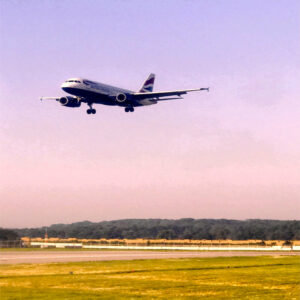
Plane landing in Salzburg
Flights are a considerable expense these days, both in money and time. To get to Europe from Australia’s east coast, you’ll need at least 24 hours of flight time; financially, it costs multiple thousands per person, a big cost before you even get there.
When looking at flights, it’s not just getting to the destination; you should consider the flight time, stopovers and whether you will have time to do anything or be stuck in the airport overnight.
There is no perfect route, so consider what airlines and routes are available and their prices. You can do multiple airline searches through search engines like Google Flights, Webjet, Expedia, and Booking.com. These engines give you costs, flight times, and sometimes changes in airlines and other combinations.
I do this as a starting point. Cheap prices often come from third-party sellers, but they are a great way to understand airlines and where they fly. I then tend to go to the airline and price that route directly.
If the destination you want to land in seems expensive, do a regional search on Google flights; the prices for nearby airports may be considerably lower. This kind of flight will require another internal flight or other transport that must be priced to get to your chosen destination, but you still could come out ahead.
Phil and I prefer the shortest flight time possible, so our flights are often on the higher end of our budgets. This is another place where communication is key. Take the time to explore how you prefer to fly and the time and money you want to spend on this portion of your trip.
Using Frequent Flyers points

Phil’s Frequent Flyer Tag
I must admit that I am no expert in using frequent flyer points to their best value, but airlines offer reward points, and when used on rewards flights, they can be a real dollar saver, so ask the question. Do you have enough points for a reward flight? You will have to pay fees and taxes; this is better than the total cost of the flight. Another way to use points if you don’t have enough for a rewards flight is to use what they call Points and Pay. This means you can use points and cash to pay for your flight, saving you a few hundred to maybe thousands of dollars. However, a total reward flight would better use your points. To learn more, check out one of the many expert pages focusing on getting the most out of points and miles on the internet.
Quite often, airlines offer a ‘Price Watch’ feature. This allows you to set a particular route and the amount you’re willing or hoping to pay for a return or one-way flight. The system will then notify you when the price matches your set amount. It’s a great tool to keep an eye on flight prices and potentially snag a good deal if you have the cash.
2. Accommodation

Residence Bologna, Prague
Where do you like to stay? Accommodation is another big ticket item for your trip, and deciding what kind of accommodation and its location can be crucial to feeling as though you get value for your money.
What sort of accommodation do you want to stay in?
There are different options, with varying prices and quality. Choose from BnBs, hostels, hotels, and full apartments, which vary in quality and value. In this video, I explain the European hotel star system and what you can expect to get for the price.
Another important thing to consider is the location and how that will impact your visit to a destination. In this video, I look at six things to consider before booking a hotel if you would like to know more.
Phil and I like to stay in the centre of town, so our accommodation budget is often a little bit dearer than what we could spend if we were prepared to be further out of town.
Using Frequent Flyer Points to Pay for Accommodation
Frequent flyer points can also be used for hotels. Again, this is not considered the best use or value, but you can often stay in hotels in the centre of a town that you might not be able to do if you had to pay cash. That’s another way to use frequent flyer points to help make your money go further. We’ve used them in London and Paris and often for date nights in Sydney.
Inclusions can vary widely, so always check when looking at accommodation. You will often find WIFI in most rooms, but you may want to include breakfast and parking if you have a car. These inclusions can save you a couple of dollars every day. Breakfast is usually basic in most places but adequate.
Sometimes, the cost of transfers from the hotel can be better than the offerings on Viator or other services.
If you’re looking at an apartment building, do you have a washing machine? That saves you 15 euros a pop to wash your clothes every few days. Some hotels have washing facilities, but they are not always free if offered.
City fees are added in many European cities. The hotels have no say in this; it is from the city and is paid at the premises in the local currency. It’s usually only a couple of euros a night, but just be aware that that will be a small added cost to your hotel accommodation.
Good Questions to ask when looking at Accommodation
What inclusions do you get in the base rate?
Are there other included facilities or paid options?
Do they offer parking? Is it free or paid at a nightly rate?
Do they offer a transfer to and from the airport? If so, what is the price?
3. Food
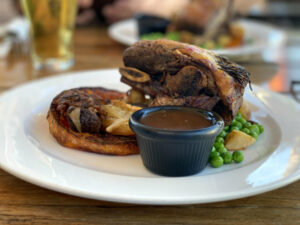
Everyone needs to eat, and how you decide to do this will affect your budget. Is there a special meal for an event you want to celebrate? What are your expectations of food experiences in a destination?
Preparing your own food is another reason to choose an apartment over a hotel. Control of your supplies may be cheaper than eating out for every meal. Doing your own cooking also helps if you have special food-related needs.
As I said above, having breakfast included in your hotel tariff means you can start your day full. This leaves lunch, dinner, and time to chill in a cafe or beer garden to people-watch and rest your tired feet to budget for.
4. Activities

happy camper
Travelling and exploring a new destination often means more than just walking around the city. Are you going to do any tours, day tours, walking tours, or multiple-day tours? Are you looking at experiences like a cooking class, a local craft class, or a wine tasting, visiting those must-see sights or entry to museums to help you get a little more immersed in the destination? These days, lots of places require timed entry and pre-purchasing tickets.
City Cards
If you want to see a lot and have a few days, a good way of saving is to look at city cards. If you do your maths, this can be a great asset. Check out our video and companion blog to learn more about city cards.
The world is full of Must-sees, but they may not be your must-sees.
Together, take the time to decide on your must-sees and pass-bys.
5. On the ground transport

Picking a hire car up in Scotland
On-the-ground transport includes buses, trains, trams, taxis, Uber/Bolt, and ferries. It can be anything from local city transport to relocation between cities and countries.
Another way to get around is by bicycle or scooter hire, exercise, and you choose your route.
Hiring a car is a great way to explore further afield; again, having a car gives you the freedom to travel at your own pace and wherever you want. Check added insurance, fees and charges, whether there is a fee to drop it off in a different location, and whether there is a mileage cap or extra driver fee. These can all add up.
Are you going to hire a car?
How many days?
What size vehicle do you require?
If you have a long distance to travel and want an easy option, flights between two shorter destinations could be cheaper, but they are not always the quickest or most convenient. With low-cost carriers offering flights everywhere, you can easily use this option. When looking at low-cost flights, check what is included and what you must pay extra to include. We have flown Ryanair several times and paid for add-ons, but it is still cheaper than other carriers. Do your math.
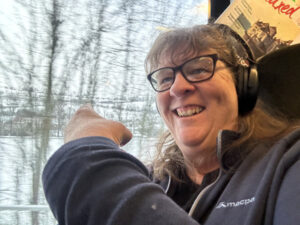
Snow travelling by train in the Czech Republic
Flying can be cheaper and seem quicker, but don’t forget that when comparing options, you must include getting to and from the airport and check-in times. However, taking a bus or train is a beautiful way to see more of the countryside, and it slows you down a bit.
6. Sourvenirs and extras

Our latest souvenirs from the Christmas trip
We all want to come home with souvenirs from our trip, so adding some souvenir money to the budget allows you to shop guilt-free. I budget enough to include clothing as a souvenir if desired. In this video, I look at 5 souvenirs for those who pack light.
And then there are those extra things you may need, like a packet of Band-Aids, shampoo, or a visit to the doctor. Extras will pop up, and a little contingency money in your budget makes them less stressful.
7. Insurance and other Admin costs
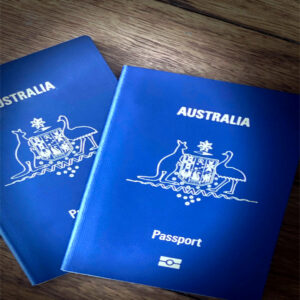
Australian Passport
Now, I do not want anyone ever to need insurance, but I will get on my high horse and say, get travel insurance. This expense stings, but if required, it could save you thousands and may get you home.
Make sure you read the product disclaimers and everything else.
Be sure that you are covered for what you are going to do. For example, if you go skiing in the Alps, ensure you are covered for skiing.
Are you going on a cruise? Is cruise cover included? How much extra will that cost?
The base policy may have limits, so read what it will cover and inquire if your planning activities are not listed. Insurance is an expense many would rather not pay for, but it only takes one instance for the cost to be worth it.
Even if you use your credit card, including insurance, read the product disclosure and what you are covered for. Going with your credit card insurance and not having coverage for your intended activities would not be a good idea.
Visa
Do you need a visa, or does your passport need renewal?
Visa can differ from country to country, and your country’s passport will factor into your need for a visa, so check the entry requirements for the places you visit against your passport.
Do you need a visa?
What’s required to get that visa, and how long before I travel do I need to get it?
Is there a cost associated with your visa?
Passport
Do you need a passport? How much and how long will it take to process and receive a passport?
Are you within that six-month window between travelling and returning home? What is the added cost of renewing your passport?
Check the entry rules for the places you are travelling. Know your country’s laws for expiring passports. In Australia, you must have at least six months left before your passport expires to get back in the country.
I share 11 documents and admin processes for your next trip in this blog.
Resources to help you in the Budget planning and Booking process
Now that we’ve had a quick look at each of the categories that I consider to be the high costs for a trip, it’s time for you to think about the priorities for your budget. Every person has their ideals about what their holiday will look like and where they want to invest their money. Part of this Travel Your Way series is to be more intentional about how you spend your money and your time. Working as a couple on travel budgeting could help you intentionally use a trip to deepen your relationship with your spouse.
Tips to Help you save
A great resource I have been using for a few years now is Budget Your Trip. You enter the country or destination that you’re heading to. At a glance, you get a daily, weekly, fortnightly, and monthly tally of how much it would cost in the local currency. To see the cost in your local currency, you hit that little currency button; it’ll display a dropdown menu where you can change your currency.
This website is a great tool to get a dollar amount in your currency for saving purposes. There’s a breakdown for food, transport, accommodation, drinking, etc. Budget Your Trip has been an excellent resource for planning trips. It gives me a reality check of how much each destination will cost. It is a great little resource to help keep us honest. And this is not sponsored. This is just me appreciating a great resource.
I have written a blog on saving tips that may inspire you to save. The blog includes information on savings plans, a no-spend period, a garage sale, higher-interest bank accounts, a good old piggy bank, online surveys, and more. I’ve also included a list of a few survey sites you may find helpful.
Other ways to help you save
One way to boost your frequent flyer points is to join a rewards program that earns points for your program. My groceries, fuel, and Credit Card accumulate points that all go towards our tally, which we spend when we are at that point in booking.
When looking at accommodation, look for freebies and included items that could save you money on the ground. I use *Booking.com for most of my accommodation.
City cards If you’ve done the math and it works out that the city card will pay for itself, you may save money on transport, see a few extra attractions free, and get discounts at restaurants and shops. Again, check out this video and blog to learn more.
Conversation starters

Hear Ye, Hear Ye
I’m a big fan of date nights. Why not have a travel budget date night where you discuss the above elements and start dreaming of your next trip? Crack open some of your favourite beverages, bring in some food, find videos on YouTube that highlight places you are discussing and start dreaming away.
If you could go anywhere, where would it be?
What are your travel budget priorities?
How will you allocate your precious money to where it will give you guys the most enjoyment?
What are your accommodation preferences, and where would you like it to be located, close to the action or out of the way?
Do you prefer to drive, bus, or train to get between places?
What are your favourite travel memories? What elements would you consider highlights and what should be considered when we travel?
Tell me about your dreams for travel experiences.
Towns or country?
Mountains or the sea?
What is your ideal travel pace?
Saving for a big overseas trip can seem daunting, but with a little prep, teamwork, and a realistic timeline, you can make it happen if you want to. Sometimes, it is about giving yourself a good amount of time to save and make it happen. Taking the time to get on the same page and listen to each other’s expectations can have a payout that neither of you saw coming. Happy budgeting!
*Booking.com links to my Affiliate link, and if you book using this link, I may earn a small commission. Thanks for your support.



